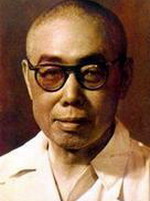| |
Born in Kunming city, Yunnan province, Nie Er displayed an interest in music from an early age. At school, he participated in the Book Club, and organized the "Nine-Nine Music Society", which performed within the school and outside. He also organized the "Chinese Contemporary Music Research Group", which participated in the Leftist Dramatist's Union. In 1933, Nie Er joined the Communist Party of China.
In early 1935, Nie Er composed the March of the Volunteers. On July 17th, 1935, he drowned while swimming in Japan, at the age of 23.
Nie Er wrote a total of 37 pieces in his life, all in the two years before his death. A significant proportion of these songs reflected working class life and struggles including Graduation Song, Progress Song, Song of the Big Road, etc. He often collaborated with lyricist Tian Han.
Tian Han (March 12, 1898 — December 10, 1968), born in Changsha city, Hunan Province, was a drama activist, playwright, a leader of revolutionary music and movies, as well as a translator and poet. Tian Han contributed a great deal to the development of Chinese modern drama as well as Chinese opera. His most famous legacy may be the lyrics he wrote for March of the Volunteers in 1934, the national anthem of the People's Republic of China.

During the May Fourth Movement in 1919, Tian Han became famous for the vigorous anti-imperialist and anti-feudalist activities in the circle of artists and intellectuals he gathered. In 1927, Tian Han taught at the Department of Literature of Shanghai Art University. Later, he joined The League of Chinese Left-Wing Dramatists. Tian Han’s major plays include Ka Fei Dian Yi Ye (A Night in the Coffee Shop) in 1922, Hu Shang de Bei Ju (A Tragedy of the Lake) in 1928, Yue Guang Qu (Moonlight Melody) in 1932, Li Ren Xing in 1959, etc.
Editor: Yan Fei
|
|
